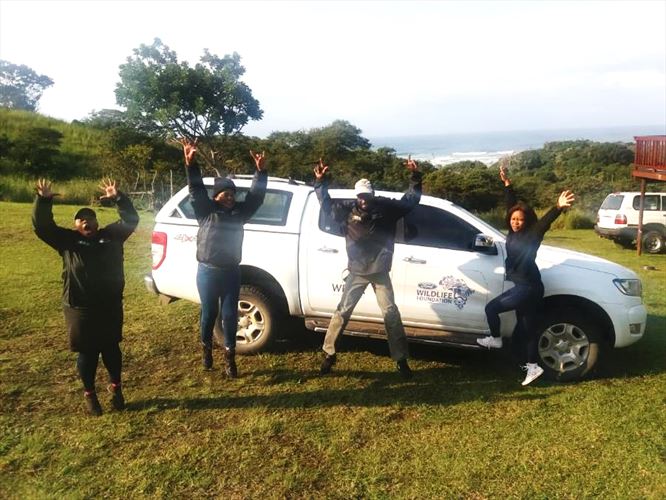Ford news

Ford Wildlife Foundation Celebrates World Environment Day
- For 30 years, Ford has supported environmental education, research, and conservation projects
- The 2020 World Environment Day theme is ‘Time for Nature’ with a focus on Biodiversity
- The Delta Environmental Centre’s Youth Environmental Services Project fosters an interest in Biodiversity and supports job creation among South African youth
PRETORIA, South Africa, 04 June 2020 – The UN Environment Programme (UNEP) annually commemorates World Environment Day on 05 June, which encourages worldwide awareness and action for the protection of the environment.
The conservation and preservation of the environment has become a major worldwide issue, dramatically changing the attitudes of both consumers and large businesses – in fact the World Economic Forum’s latest Global Risks Report recognised that around 1 million animal and plant species are now threatened with extinction, many within decades, which is more than ever before in human history. The report also noted that the top five risks to business around the world are environmental.
For 30 years, Ford has supported environmental education, research, and conservation projects around sub-Saharan Africa with the ethos that, as a responsible corporate citizen, Ford, its employees, and its dealers have an obligation to play their part in securing our natural resources for future generations. The Ford Wildlife Foundation currently has 25 Rangers on loan to partner organisations, for the effective implementation of their projects. These capable, safe, and dependable bakkies are proudly built right here in South Africa, at our Silverton assembly plant in Pretoria, with advanced new diesel engines from our Struandale engine plant in Port Elizabeth
“This years’ theme for World Environment Day 2020, ‘Time for Nature,’ with a focus on biodiversity, is one that strongly resonates with us,” says Lynda du Plessis, manager of the Ford Wildlife Foundation. “Environmental education projects that bring information about the country’s biodiversity to the population are a crucial component of the Foundation’s objectives, as are research projects that investigate the impact of human activities on the environment.”
According to the UN Environment programme, biodiversity describes the variety of life on Earth. It encompasses the 8 million species on the planet – from plants and animals to fungi and bacteria; the ecosystems that house them; and the genetic diversity among them.
South Africa is well known for its cultural and linguistic diversity but it is also environmentally diverse and is recognised as one of the most biodiverse countries in the world. Although probably best known for its enviable population of the Big 5 it is also incredibly rich in plant species – for example 70% of the Cape Floral Kingdom’s 9600 plants are found nowhere else on Earth.
The South African National Development Plan: Vision 2030 confirms that national economic growth is dependent on environmental sustainability. In order to make the necessary shift, the political importance of biodiversity needs to be understood at the highest levels. With an increasing focus on leveraging our nations rich biodiversity there is a growing focus on educating the youth.
According to the World Economic Forum (WEF) the world’s ten youngest populations reside in Africa and in South Africa the STATSSA mid-year estimates of 2019, indicate almost a third of the population (17,84 million) are aged 18–34. Youth are therefore critical to the success of conservation efforts on the continent.
“We know that Africa is the largest concentration of young people in the world, so if we want to make an impact on conservation in Africa, youth must be on the frontlines of advocating for transformative environmental policymaking as well as implementation,” says du Plessis.
An independent non-profit organisation the Delta Environmental Centre aims, through innovative education and training programmes and consultation, to enable young people to improve the quality of their environment. Its school programmes make extensive use of the Delta Environmental Centre as well as Delta Park, a 100-hectare “outdoor classroom” consisting of the Natural History Museum, The Biodiversity Room with an insect collection and animal skulls, the Florence Bloom Bird Sanctuary, the Energy Room and the Water Room.
“Environmental education projects that bring information about the country’s biodiversity to the population are a crucial component of the Ford Wildlife Foundation’s objectives and though many of our projects have a strong educational element the Delta Environmental Centre’s Youth Environmental Service project stands out as an initiative that creates employment opportunities from environmental conservation,” said du Plessis.
Run by the Delta Environmental Centre, with support from the Ford Wildlife Foundation in the form of a Ranger, the Gauteng Youth Environmental Services Project is an accredited training environmental skills programme focused on professional development for 270 unemployed youth. Participants are actively engaged in doing community work with practical and theoretical training that expose learners to hands-on examples of sustainable living.
The main outcome of this project is for youth to realise a career opportunity in the environmental sector and be active participants in their societies and economy.
Another organisation the Ford Wildlife Foundation supports is Wildlife and Environment Society of South Africa (WESSA). “We support the Tourism Green Coast project with a Ford Ranger that is used for activities such as site support visits, training and awareness events and the distribution of materials,” explains du Plessis.
Working with the Department of Tourism, WESSA conceptualised and implemented the innovative public works learnership project called Green Coast Stewards. Funding from the department allowed for the recruitment of 115 previously disadvantaged youth from the communities surrounding 21 focus sites located along the Wild Coast. The participants are paid a monthly stipend to support them and their attendance of the NQF Level 2 accredited Tourism Guiding course, which WESSA facilitates. They are also given other non-accredited training in ecology, environmental education, professional development, first-aid and health safety as well as child safety in tourism.
“World Environment Day is putting a spotlight on the importance of biodiversity in our everyday lives but we would also like to commemorate the day by highlighting the importance of biodiversity among our youth. Our young people have a duty of responsibility to our environment but equally our environment has much to offer them in terms of future prosperity and we would like to thank and honour our project partners like the Delta Environmental Centres Gauteng Youth Environment Services for creating those opportunities for young people in our country,” concludes du Plessis.
Read the latest news from Ford South Africa by visiting the Newsroom:
https://www.ford.co.za/about-ford/newsroom/
Original article and image as supplied by QuickPic











